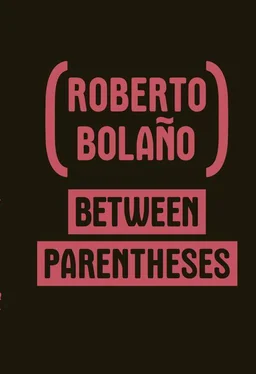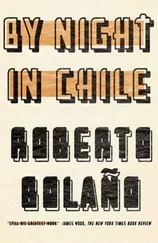Roberto Bolaño - Between Parentheses - Essays, Articles and Speeches, 1998-2003
Здесь есть возможность читать онлайн «Roberto Bolaño - Between Parentheses - Essays, Articles and Speeches, 1998-2003» весь текст электронной книги совершенно бесплатно (целиком полную версию без сокращений). В некоторых случаях можно слушать аудио, скачать через торрент в формате fb2 и присутствует краткое содержание. Год выпуска: 2011, Издательство: New Directions, Жанр: Публицистика, Критика, на английском языке. Описание произведения, (предисловие) а так же отзывы посетителей доступны на портале библиотеки ЛибКат.
- Название:Between Parentheses: Essays, Articles and Speeches, 1998-2003
- Автор:
- Издательство:New Directions
- Жанр:
- Год:2011
- ISBN:нет данных
- Рейтинг книги:4 / 5. Голосов: 1
-
Избранное:Добавить в избранное
- Отзывы:
-
Ваша оценка:
- 80
- 1
- 2
- 3
- 4
- 5
Between Parentheses: Essays, Articles and Speeches, 1998-2003: краткое содержание, описание и аннотация
Предлагаем к чтению аннотацию, описание, краткое содержание или предисловие (зависит от того, что написал сам автор книги «Between Parentheses: Essays, Articles and Speeches, 1998-2003»). Если вы не нашли необходимую информацию о книге — напишите в комментариях, мы постараемся отыскать её.
The Savage Detectives
Between Parenthese
Between Parentheses: Essays, Articles and Speeches, 1998-2003 — читать онлайн бесплатно полную книгу (весь текст) целиком
Ниже представлен текст книги, разбитый по страницам. Система сохранения места последней прочитанной страницы, позволяет с удобством читать онлайн бесплатно книгу «Between Parentheses: Essays, Articles and Speeches, 1998-2003», без необходимости каждый раз заново искать на чём Вы остановились. Поставьте закладку, и сможете в любой момент перейти на страницу, на которой закончили чтение.
Интервал:
Закладка:
The End: “Distant Star”
(Interview with Mónica Maristain)
On the lackluster literature scene in the Spanish-speaking world, a space where young writers turn up every day who care more about collecting grants than about contributing anything to artistic creation, the figure of a lean man stands out, blue backpack at the ready, huge glasses, eternal cigarette in hand, and subtle irony delivered rapid-fire.
Roberto Bolaño, born in Chile in 1953, is the best thing that’s happened to the craft of writing in a long time. Since his monumental novel The Savage Detectives , perhaps the great contemporary Mexican novel, brought him fame and garnered him the Herralde Prize (1998) and the Rómulo Gallegos Prize (1999), he has continued to grow in influence and stature. Everything he says (with pointed humor and exquisite intelligence), and everything he writes (at great poetic risk and with deep creative commitment, his pen unerring) merits the attention of those who admire him, and, of course, of those who detest him.
The author, who appears as a character in the novel Soldiers of Salamis , by Javier Cercas, and who is paid homage in Jorge Volpi’s latest novel, El fin de la locura [The End of Madness], is, like all brilliant men, a divisive figure, someone who inspires antipathy despite his gentle nature and despite his voice, somewhere between high-pitched and hoarse, in which he tells Playboy that he can’t write a story for the magazine because he’s still working on his next novel, which is already 900 pages long and will be about the killings of women in Ciudad Juárez.
Roberto Bolaño lives in Blanes, Spain, and he’s very sick. He hopes that a liver transplant will give him the strength to live with the intensity lauded by those fortunate enough to know him personally. These people, his friends, say that when he’s writing he sometimes forgets to go to doctors’ appointments.
At fifty, this man — who backpacked across Latin America, who escaped the clutches of Pinochet’s regime because one of his jailors was once a classmate, who lived in Mexico, who met the militants of the Farabundo Martí (future assassins of Roque Dalton) in El Salvador, who was a watchman at a campground in Catalonia, a seller of costume jewelry in Europe, and always a pilferer of good books, because reading demands action, not just attitude — has changed the course of Latin American literature. And he’s done it suddenly and without begging anyone’s leave.
PLAYBOY: Was it hard being born dyslexic?
BOLAÑO: No. Playing soccer was hard; I’m left-footed. Masturbating was hard; I’m left-handed. Writing was hard; I’m right-handed. But as you can see, no serious difficulties.
PLAYBOY: Is Enrique Vila-Matas still your friend after your fight with the organizers of the Rómulo Gallegos Prize?
BOLAÑO: My fight with the jury and the organizers of the prize was basically due to the fact that they wanted me, from Blanes and sight unseen, to endorse a selection that I’d had nothing to do with. Their methods, which a Chavista pseudo-poet communicated to me by phone, reeked of the persuasive techniques of the Casa de las Américas in Cuba. I thought it was a huge mistake that Daniel Sada and Jorge Volpi were eliminated early on, for example. They said that what I wanted was a free trip with my wife and children, which was completely untrue. Out of my indignation about that lie came the letter in which I called them neo-Stalinists and worse, I guess. Actually, I was informed that from the very start they intended to give the prize to a different author, not Vila-Matas, as it happens, whose novel I thought was good, and who was definitely one of my candidates.
PLAYBOY: Why doesn’t your office have air conditioning?
BOLAÑO: My motto isn’t Et in Arcadia ego but Et in Esparta ego .
PLAYBOY: Don’t you think that if you’d gotten drunk with Isabel Allende and Ángeles Mastretta you’d feel differently about their books?
BOLAÑO: I doubt it. First, because there’s no way those two ladies would go out drinking with me. Second, because I don’t drink anymore. Third, because even at my drunkest moments I never lost a certain basic clarity, a sense of style and rhythm, a horror of plagiarism, mediocrity, and silence.
PLAYBOY: What’s the difference between an authoress and a writer?
BOLAÑO: Silvina Ocampo is a writer. Marcela Serrano is an authoress. A distance of light years separates them.
PLAYBOY: What makes you think that you’re a better poet than novelist?
BOLAÑO: I judge by how much I blush when I open a book of my poetry or my prose. The poetry makes me blush less.
PLAYBOY: Are you Chilean, Spanish, or Mexican?
BOLAÑO: I’m Latin American.
PLAYBOY: What does homeland mean to you?
BOLAÑO: I’m afraid I have to give you a sappy answer. My two children, Lautaro and Alexandra, are my only homeland. And in second place, maybe a few instants, a few streets, a few faces or scenes or books that live inside me. Things I’ll forget someday, which is the best remedy for homelands.
PLAYBOY: What is Chilean literature?
BOLAÑO: Probably the nightmares of Carlos Pezoa Véliz, who was the bitterest and grayest and perhaps most cowardly of Chilean poets. He died at the beginning of the twentieth century and wrote just two memorable poems, though they were truly memorable, and he still sees us in his dreams and is tormented. Maybe he hasn’t actually died yet, and we’re all a part of his long death throes. Or at least we Chileans are a part of them.
PLAYBOY: Why do you like to be so contrary?
BOLAÑO: I’m never contrary.
PLAYBOY: Do you have more friends than enemies?
BOLAÑO: My best friend was the poet Mario Santiago, who died in 1998. Right now three of my best friends are Ignacio Echevarría, Rodrigo Fresán, and A.G. Porta.
PLAYBOY: Did Antonio Skármeta ask you to be on his show?
BOLAÑO: One of his secretaries called me, or maybe it was the cleaning lady. I told her I was too busy.
PLAYBOY: Did Javier Cercas share the royalties for Soldiers of Salamis with you?
BOLAÑO: No, of course not.
PLAYBOY: Enrique Lihn, Jorge Teillier, or Nicanor Parra?
BOLAÑO: Nicanor Parra over everyone else, including Pablo Neruda and Vicente Huidobro and Gabriela Mistral.
PLAYBOY: Eugenio Montale, T. S. Eliot, or Xavier Villaurrutia?
BOLAÑO: Montale. If it were James Joyce instead of Eliot, then Joyce. If it were Ezra Pound instead of Eliot, then definitely Pound.
PLAYBOY: John Lennon, Lady Di, or Elvis Presley?
BOLAÑO: The Pogues. Or Suicide. Or Bob Dylan. But let’s not split hairs: Elvis forever. Elvis wearing a sheriff’s badge and driving a Mustang, popping pills. Elvis and his golden voice.
PLAYBOY: Who reads more, you or Rodrigo Fresán?
BOLAÑO: It depends. Rodrigo takes the West. I take the East. Then we tell each other about the books from our respective domains and it’s as if we’d read them all.
PLAYBOY: What is Pablo Neruda’s best poem?
BOLAÑO: Almost anything from Residence on Earth .
PLAYBOY: If you’d met her, what would you have said to Gabriela Mistral?
BOLAÑO: Mother, forgive me, I’ve sinned, but I was saved by the love of a woman.
PLAYBOY: And Salvador Allende?
BOLAÑO: Not much, if anything. Those in power (even if it’s only for a little while) know nothing about literature, all they care about is power. And I’ll play the fool for my readers, if I feel like it, but never for the powerful. That may sound melodramatic. It may sound like the declaration of an honest hooker. But it’s the truth, in the end.
PLAYBOY: And Vicente Huidobro?
BOLAÑO: Huidobro bores me a little. Too much trilling and tra-la-la-ing, too much of the parachutist who sings Tyrolean songs as he falls. Better the parachutist who plummets in flames, or the parachutist whose parachute simply never opens.
Читать дальшеИнтервал:
Закладка:
Похожие книги на «Between Parentheses: Essays, Articles and Speeches, 1998-2003»
Представляем Вашему вниманию похожие книги на «Between Parentheses: Essays, Articles and Speeches, 1998-2003» списком для выбора. Мы отобрали схожую по названию и смыслу литературу в надежде предоставить читателям больше вариантов отыскать новые, интересные, ещё непрочитанные произведения.
Обсуждение, отзывы о книге «Between Parentheses: Essays, Articles and Speeches, 1998-2003» и просто собственные мнения читателей. Оставьте ваши комментарии, напишите, что Вы думаете о произведении, его смысле или главных героях. Укажите что конкретно понравилось, а что нет, и почему Вы так считаете.












